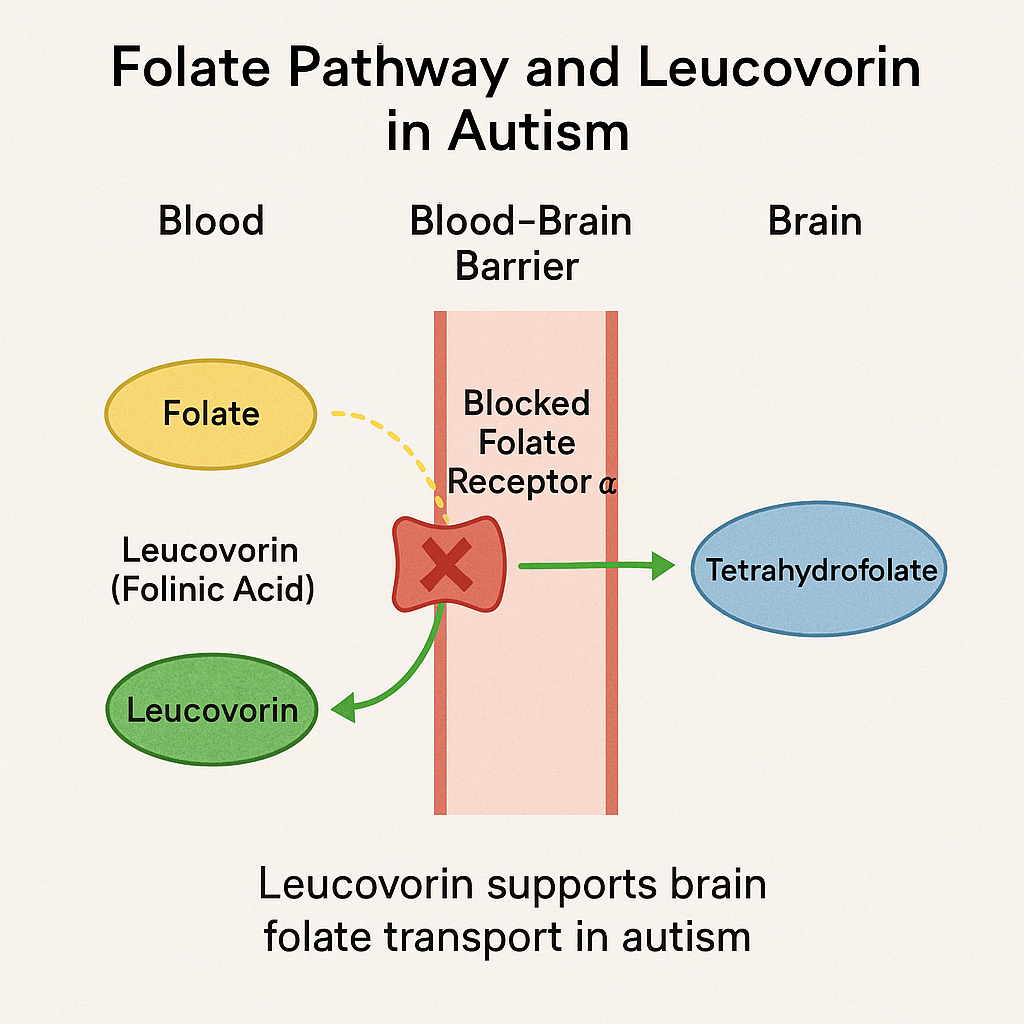(Why this therapy may help — and why it’s only one part of the whole picture)
Why Folate Matters for the Brain
Folate—also known as vitamin B9—is essential for brain development, neurotransmitter production, and detoxification. It supports processes like methylation and DNA repair that help the brain grow and function well.
But in some children on the autism spectrum, folate has trouble getting into the brain where it’s needed most. Even when blood tests show normal folate levels, the transport mechanism that moves folate across the blood–brain barrier can be blocked.
This is called Cerebral Folate Deficiency (CFD). Often, it’s linked to folate receptor alpha autoantibodies (FRAAs)—immune proteins that block the receptor responsible for carrying folate into the brain.
When this happens, kids may experience language delays, irritability, fatigue, or developmental plateaus that don’t improve with diet or therapy alone. In a functional medicine framework, this is one of many possible “root causes” we explore when progress feels stuck.
What Leucovorin Is—and How It Works
Leucovorin (folinic acid) is an active form of folate that can bypass the blocked receptor and still reach the brain.
While standard folic acid depends on the folate receptor α (FRα) to cross into the central nervous system, leucovorin uses an alternate pathway—the reduced folate carrier (RFC)—to deliver active folate directly to where it’s needed.
Once in the brain, leucovorin supports the same vital processes as natural folate: methylation, neurotransmitter balance, and mitochondrial function.
This is what makes it different from over-the-counter folic acid supplements. For children with FRAAs or other transport problems, leucovorin can sometimes “open a different door” and restore function that was otherwise blocked.
What Dr. Richard Frye’s Research Shows
Dr. Richard E. Frye, a pediatric neurologist and researcher, has published multiple studies exploring folate metabolism in autism. His work shows:
- High rates of FRAA positivity (around 70 %) in children with autism.
- Improved verbal communication and language development in FRAA-positive children treated with folinic acid.
- Better social engagement and reduced irritability in several studies.
- Dose-dependent effects: those with higher antibody levels often show stronger responses.
- Good safety profile: side effects are generally mild and temporary (agitation, sleep changes, or headaches).
In other words, leucovorin appears to help when a clear folate-transport issue is identified—and when it’s introduced thoughtfully, as part of a broader plan.
Why It’s Not the Whole Picture
Folinic acid can make a big difference—but only if the rest of the system can support that change.
Folate metabolism is connected to everything from gut health to mitochondrial energy, detox pathways, and sleep. If those areas are still under strain, leucovorin alone may only move things partway.
Functional medicine focuses on strengthening these foundations so that targeted therapies like leucovorin can work more effectively.
That means also looking at:
- A nutrient-dense, anti-inflammatory diet
- A healthy gut and balanced microbiome
- Adequate mitochondrial and detox support
- Quality sleep and stress regulation
- Coordinated supplement and medication routines
When these systems are supported, we tend to see steadier, longer-lasting improvements—speech that continues to build, behavior that stabilizes, and energy that feels more consistent.
Testing and Clinical Considerations
If a child’s history or symptoms suggest a possible folate-transport issue, a physician can order FRAA testing (and sometimes tests for soluble folate-binding proteins).
When results confirm an issue, leucovorin may be prescribed under medical supervision. Doses vary, but all studies emphasize close monitoring and gradual introduction.
Families should never start this on their own. It’s best used as part of a coordinated plan with a clinician who understands neurometabolic or functional medicine approaches.
A Functional Medicine Lens
In functional medicine, we rarely look for a single “answer.”
We look for patterns—nutrient pathways that need support, inflammation that needs calming, and systems that need connection.
Leucovorin can be a powerful tool for some children, especially those with confirmed folate receptor antibodies, but it’s one piece of a much larger puzzle. When we zoom out and build a foundation that supports methylation, detox, sleep, and digestion, the body can finally use these targeted interventions the way they’re intended.
Your Family’s Roadmap to Healing
If you’ve heard about leucovorin or FRAA testing and aren’t sure if it fits your child’s picture, I can help you sort through it.
Together, we can:
- Understand what testing might be appropriate
- Prepare visit-ready labs and questions for your clinician
- Translate complex recommendations into clear, doable steps
- Build the foundations that make biomedical interventions more effective
You don’t have to figure this out alone.
Step by step, we can build a roadmap that helps your child’s body work better—so therapies like leucovorin can make the difference they’re meant to.

References:
- Frye R.E. et al. Folinic acid improves verbal communication in children with autism spectrum disorder and language impairment: a randomized double-blind placebo-controlled trial. Mol Psychiatry (2016)
- Rossignol D.A., Frye R.E. Folinic acid in autism spectrum disorder: a systematic review and meta-analysis. Prog Neuropsychopharmacol Biol Psychiatry (2021)
- Frye R.E. et al. Biomarker associations and clinical response to folinic acid in autism spectrum disorder. Front Neurosci (2024)